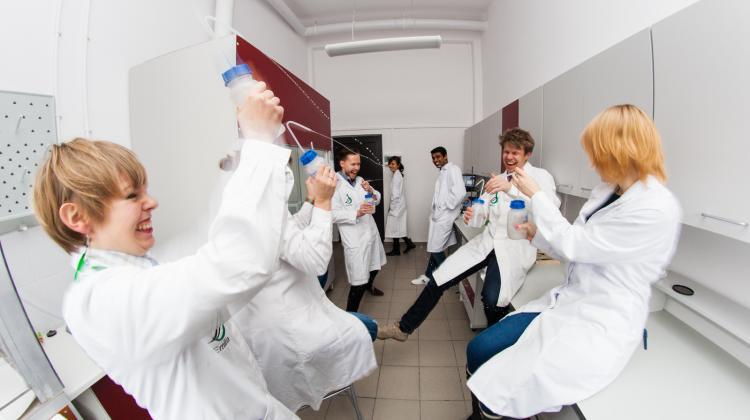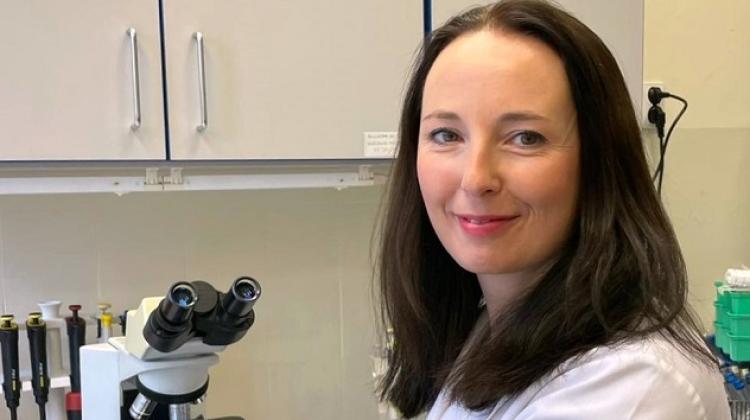What will grow out of it... on electrodes
 Source: Dr. Emilia Witkowska Nery
Source: Dr. Emilia Witkowska Nery
An innovative cell culture system can improve drug testing and disease models. Dr. Emilia Witkowska Nery proposes to grow cells directly on a three-dimensional substrate with electrodes. She is working on sensors that will provide information directly from the culture; they will signal whether the drug substance is working or not.
The researcher from the Institute of Physical Chemistry of the Polish Academy of Sciences was awarded in this year`s edition of the START stipend programme of the Foundation for Polish Science. In the LIDER programme of the National Centre for Research and Development, she develops a sensor system that can be used, for example, in drug screening.
CULTURE ON GLASS HAS NOTHING TO DO WITH AN ORGANISM
As the leader of the research project, Dr. Emilia Witkowska Nery works on a cell culture vessel that will enable the growth of cells in three dimensions and their simultaneous analysis. She emphasizes that cells grown in three dimensions, in a gel or sponge, allow to obtain much better test results.
The researcher explains that flat culture is standard in laboratories. In comparison, 3D cultures allow to obtain conditions much closer to those observed in a living organism. And yet, despite more than 50 years of work on new substrates, their use is negligible due to lack of standardization and evaluation methods for this type of cultures. Cells are still grown on slides, in two dimensions, in non-physiological conditions, for example with high oxygen availability.
Scientists also use flat cultures with electrodes in the bottom, but - as Dr. Witkowska Nery notes - it is still unknown what is going on inside the culture. Traditional analysis of cell cultures is based on optical methods, including fluorescence techniques and microscopy. It is difficult to thoroughly examine a three-dimensional structure under a microscope. Yes, you can insert a sample, but the penetration is too low and what is on top obscures what is below. There are also effects of light scattering on individual layers.
"Electrochemical methods allow to conduct real-time measurements, often with high spatial resolution, both in vitro and in vivo. Electrodes can be used to analyse metabolites released by the cell, or to assess the consumption of compounds in the culture medium. They can also generate compounds in the immediate vicinity of the cell, and then measure the cell`s reaction to such stimulation" - the researcher explains.
She adds that many systems have been proposed for two-dimensional cultures, but so far no system has been created to enable such measurements in three-dimensional cultures. Therefore, she proposed using electrodes integrated in the culture vessel.
Dr. Witkowska Nery carried out preliminary research as part of the MINIATURA project of the National Science Centre. After an international presentation, Prof. H. Girault from the École polytechnique fédérale de Lausanne proposed using the results for the currently developed electrochemical methods of skin cancer analysis.
The LIDER programme supports research to develop an integrated measurement platform for cytotoxicity and hepatotoxicity studies in liver cell cultures and neurotransmitter studies in three-dimensional neuronal cultures.
The device the researcher is working on is addressed to both scientists and the pharmaceutical industry, including cancer research, new drugs, toxicology and tissue engineering. Adamed has announced its plans to use the prototype for drug screening. "The experience gained from the attempt to create a start-up shows that investors require the prototype to be tested also outside the laboratory. Therefore, cooperation with Adamed is important to us" - emphasises the innovator.
START-UP ON ELECTRONIC TONGUES
Dr Witkowska Nery is a graduate of the Warsaw University of Technology. She started working on electronic tongues. These are sensor systems that try to imitate the sense of taste. Like the human tongue, over time they build their own `database of flavours`. Human tongue is equipped with several types of sensors that send a very complicated signal for analysis in the brain. In the case of sensor matrices, this signal is subject to computer mathematical analysis.
"We receive a signal that something is sweet, but it is only as a result of experience that our brain can distinguish between the sweet taste of fruit and a sugar cube or teaspoon of honey. Similarly, an electronic tongue must +try+ before it can recognise fructose, lactose or sucrose" - explains the designer of micro-machines capable of learning.
Electronic tongues allow to distinguish between original wines and counterfeits, clean water and water in which bacteria, viruses and fungi threaten travellers in exotic regions. They can be used to determine whether organic foods we buy really do not contain pesticides. Dr. Witkowska Nery developed small devices in the laboratory that tourists could use for quick water analysis. "This is how the idea for a start-up was born" - explains the winner of the Girls Go Start-up Academy competition. The Polish researcher brought the best idea for an innovative company to the finals of the competition in London.
Dr. Witkowska Nery defended her doctoral dissertation in the field of analytical chemistry in Brazil. Her doctoral dissertation received the international Springer Theses award and was published in book form, in addition the results were described in articles in Analytica Chimica Acta and Electroanalysis.
RESEARCHER AND WRITER
During her journeys that the researcher loves to combine with academic work, the most inspiring part proved to be ... problems. While on a traineeship in China, she could not send any photos to her family and friends. For this reason, she started to write a diary that was later published in book form - a literary, very personal, myth-busting story about travelling to the country of tea and its inhabitants.
In addition to strictly scientific activities, Dr. Witkowska Nery promotes science during Science Picnics, conducts laboratory lessons for primary and secondary school students, panel discussions for PhD students. She is a semi-finalist of the Famelab competition.
PAP - Science in Poland, Karolina Duszczyk
kol/ zan/ kap/
tr. RL
Przed dodaniem komentarza prosimy o zapoznanie z Regulaminem forum serwisu Nauka w Polsce.















